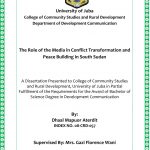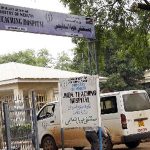By Thon Thon
Following my recent visit to China, in which I attended a seminar on Parasitic Diseases Control and Elimination with the view to sharing experiences in service delivery structure and social administration of the Chinese system, I find it relevant to reflect on a few things. I believe every South Sudan who visits China is amazed by the legend of Chinese country whose territory is covering approximately 9.6 million square kilometers. It is the world’s second large area with a population of over 1.381 billion.
The state is governed by the Communist Party of China, the vanguard party based in Beijing, its capital. The adage ‘no pain no gain’ – if you don’t work you won’t have food – rules China. Nobody wears eyeglasses or suits, no idleness at all. Behind the Chinese people is their unwavering government, with laws that satisfy their worth. Once you get there, you think of remaining there. Such is the state of a country every citizen aspires to live in. It is my hope that South Sudan will once get to that status.
Against the current understanding that South Sudanese are people who regard dependence as a value, with idleness, tribalism and corruption as rights, one should never lose hope at all. We should understand that being corrupt can make a society poorer. But living by a rule as noble as ‘one child, one teacher, one book’ can change lives and that education is the only solution, to quote from BBC broadcast.
Being a citizen from a poverty-stricken country, making priorities was a difficult thing during my stay in China. One afternoon I was stuck between the temptation to buy a smart phone like participants from other parts of the world and saving little for use when I return home. And such subtle issues define a much bigger underlying psychological torture. I perceived that fellow participants could buy luxurious items because they did not have qualms behind them at home as their governments adequately invested in them, unlike my case.
Facilitators of good leadership and what it constitutes
There are many reasons, I believe, to use wisdom to serve our citizens instead of destroying them and the little they have made. South Sudan has suffered internal conflicts since independence in July 2011, a situation that has ascribed it a fragile state (in what was formerly called Failed States Index). Whether the ranking was transparent or politically skewed is a debate beyond this writing. Yet there is some general belief that government failure to pay attention to issues of good governance contributed to this degradation.
A rational citizen would observe that South Sudanese have kept quiet for long as they watched their custodians of authority misbehave and do wrong things.
Simple Case Studies for Comparison
To begin with its history from 1949 to present, including the period from its founding in 1949 until late 1978, the People’s Republic of China was a Soviet-style centrally planned economy. Following Mao’s death in 1976 and the consequent end of the Cultural Revolution, Deng Xiaoping and the new Chinese leadership began to reform the economy and move towards a more market-oriented mixed economy under one-party rule. Agricultural collectivization was dismantled and farmlands privatized, while foreign trade became a major new focus, leading to the creation of Special Economic Zones. Inefficient state-owned enterprises were restructured and unprofitable ones were closed outright, resulting in massive job losses. Today China is mainly characterized as having a market economy based on private property ownership, and is one of the leading examples of state capitalism. The state still dominates in strategic “pillar” sectors such as energy production and heavy industries, but private enterprise has expanded enormously, with around 30 million private businesses recorded in 2008.
Compare how South Sudan’s economic and political affairs are being run with China’s past and note that we are not too wide of the mark. Our economy is one of the world’s most underdeveloped, with little existing infrastructure and the highest maternal mortality because of poor health services. Our country largely depends on imports although it is endowed with many natural resources such as petroleum, iron ore, copper, chromium ore, zinc, tungsten, mica, silver, gold, diamond, hardwoods, limestone and hydropower. The country’s economy, as in many other developing countries, is heavily dependent on oil. Apart from natural resources-based companies, other such organizations include South Sudan Beverages Limited as a subsidiary. There are too many resources but the country is still experiencing shortage of food and poor health, high illiteracy rate, and infrastructures. How can South Sudan, a rich country, speaking in terms of resources, have the poorest population on earth? The protracted civil war that deprived the then Southern region of capable human resource development to exploit its huge potential is to blame, yet this is confounded by emergence of weak institutions that are further undermined by patronage and corruption in the new nation.
People, Resources and Environment
In China there is shortage of natural resources, but still they have made the garden cities of Beijing, Shanghai and Jiangsu. I remark of them as the best places to live on earth; they are high potential investment worldwide. At its establishment not very long ago, the situation in China was bad, the national economy was on the brink of collapse, people lived in poverty, social chaos and so on. Thanks to the tenacity of China, the country eventually prospered. Remember that behind prosperity there is wisdom; the Chinese drew on both Eastern and Western lessons to govern their country and society.
The 2005 Comprehensive Peace Agreement (CPA) acts as the benchmark of South Sudan’s existence, counting back to eleven years now. There has been considerable, albeit slow-paced development. It is time government officials practiced and internalized a new spirit of loyalty, filial duty, piety, benevolence, love, prosperity, righteousness, honesty, sense of shame, as their code of conduct and ethics.
Enablers of Good Governance and Checklists for Able Government
A life of abundance and security should not be a wish. Dignity is a citizen’s right. While authorities should strive to provide a favourable political and socio-economic environment, all citizens should be peace-loving and hardworking. There should be clearly spelt out rewards for hard work and punishments for immoral practices. Welfare is not for lazybones, who in fact deserve poverty.
All South Sudanese should believe that fundamental requirements for good life include hard work and use of dragoman law brand with stating effort, equality before the law, and liberty. Laws must never be skewed during enforcement to favour a few godfathers or whoever is caught in violation. For example, placards bearing ‘Keep Environment Clean. Fine of 700 SSP for Dumping’ should be widely placed in urban areas and enforced to an extent that any high-ranking official violating this can be punished by law.
Leaders who truly love their subjects are always ready to sacrifice for their welfare. A good leader can do to a great extent to show his love and affection for them. This virtue is the distinctive redline between altruists and selfish beings who crawl to stewardship unnoticed. Therefore, it is incumbent upon our leaders to act in good faith towards their citizens. Although they may not have performed to everybody’s satisfaction over the past years, South Sudanese leaders are still on stage to end bloodshed, know the unknown gunmen who have terrorized the population, provide food security, minimize patronage and corruption, and build roads, schools and hospitals. There is no miracle other than this that can restore public confidence in them. There is no room for rhetoric; apologetic speeches must stop.
Dos and Don’ts on Prosperity
As there is no shortcut to the prosperity of a country, all successful countries have passed through this difficult path. I highly recommend that the China way is adopted as a template for building our own. Through China we can learn that ‘hard work and human civilization’ would immensely contribute to the development of our country.
It constitutes an act of irresponsibility to attribute challenges facing South Sudan to authorities. Since the December 2013 crisis, youths have dipped their hands into mischievous actions. We should disown and abandon the tribal ideologies of kith and kin in authority because the future belongs to us and upcoming generations.
The writer is a concerned South Sudanese who sojourned China in the past month. He can be reached at thonaruai@yahoo.com



